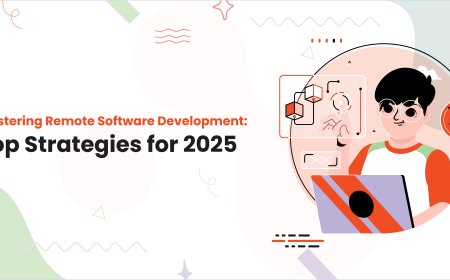Is Bubble the Future of Full-Stack Development or a Temporary Hack?

Introduction: The Rise of No-Code Development
In the ever-evolving landscape of software development, the rise of no-code platforms has sparked both enthusiasm and skepticism. At the forefront of this revolution stands Bubble, a powerful visual programming platform that enables users to build full-fledged web applications without writing traditional code. The big question: is Bubble the future of full-stack developmentor merely a temporary workaround for MVPs and side projects?
For businesses and individuals alike, the implications are huge. Whether you're an entrepreneur seeking to validate a startup idea or a company hiring a no code dev agency, understanding Bubbles potential is crucial.
What is Bubble?
Bubble is a no-code platform designed to empower users to build complex web applications using a drag-and-drop interface. Unlike traditional website builders, Bubble includes logic, database integration, user authentication, and API connectivityfeatures typically reserved for full-stack frameworks like Node.js or Django.
At its core, Bubble is:
-
A visual front-end builder
-
A logic engine for workflows and conditional behavior
-
A built-in back-end/database environment
-
Fully extendable with APIs and plugins
This versatility makes it a favorite among no code dev agencies that aim to launch scalable web apps faster and more affordably than traditional methods.
Why Bubble is Gaining Popularity
1. Speed to Market
The biggest advantage Bubble offers is speed. You can build a functional prototype or even a full application in weeks, not months. This is ideal for startups and founders under pressure to test and validate their product quickly.
2. Lower Costs
Hiring a full-stack development team is expensive. Bubble eliminates the need for multiple specialistsfront-end, back-end, DevOps, etc.by allowing a single no code dev agency or even a solo founder to manage the entire stack.
3. Flexibility
With its API connector, plugin system, and JavaScript integration, Bubble is more flexible than most no-code tools. Its capable of powering everything from simple landing pages to full SaaS platforms, marketplaces, and internal tools.
Is Bubble Full-Stack or Just a Stack-Lite?
Bubble claims to be a full-stack solutionand in many ways, it is. You can build everything from the user interface to database schemas and backend logic in one unified environment. But does that make it a true replacement for traditional full-stack development?
Where Bubble Shines:
-
Unified platform
-
Rapid iterations
-
Built-in user authentication and role-based access
-
Scalable back-end with workflow automation and API support
Where It Falls Short:
-
Performance limitations with large datasets or complex workflows
-
Customization bottlenecks for advanced UI/UX or niche backend logic
-
SEO and speed issues for large public-facing sites
-
Vendor lock-in concerns when migrating away from the platform
Bubble vs Traditional Full-Stack Frameworks
Bubble:
-
Low learning curve
-
Very fast build time
-
Moderate customization
-
Moderate scalability
-
Low cost
-
Solo builder or no code dev agency is enough
Traditional Stack (e.g., React + Node.js):
-
High learning curve
-
Moderate to slow build time
-
Very high customization
-
High scalability
-
Higher cost
-
Full development team needed
Use Cases Where Bubble Excels
-
Startup MVPs: Ideal for testing concepts and iterating fast
-
Internal Tools: Great for dashboards, CRMs, and workflow apps
-
Marketplaces & SaaS Apps: Capable of complex app logic and payment systems
-
Client Portals: Easy to manage users, data, and secure content
A no code dev agency can use Bubble to build these types of solutions in a fraction of the time and cost of traditional development.
Use Cases Where Traditional Code Wins
-
High-performance apps like video processing, real-time games, or fintech platforms
-
Highly customized front-end interfaces with pixel-perfect precision
-
Large-scale data apps requiring advanced queries and performance optimization
-
AI/ML-heavy applications that require custom model training and deployment
Is Bubble the Future or a Fad?
Arguments for the Future:
-
Expanding plugin ecosystem
-
Startups raising venture capital with Bubble-built MVPs
-
More no code dev agencies specializing in Bubble
-
Constant platform updates focused on performance and scalability
Arguments for a Temporary Hack:
-
Technical limitations on performance and SEO
-
Complexity in debugging visual workflows
-
Difficulty in migrating to traditional stacks
-
Risk of relying on a proprietary platform
The Role of No Code Dev Agencies
As Bubble grows, so does the need for experts who understand how to use it effectively. No code dev agencies offer the expertise needed to:
-
Build scalable and robust apps
-
Optimize app performance
-
Navigate limitations with smart architecture
-
Integrate APIs, databases, and third-party services
Working with a no code dev agency means you can move fast without sacrificing quality or functionality. These agencies bridge the gap between raw Bubble capabilities and real-world business needs.
Conclusion: So, Whats the Verdict?
Bubble is more than a hackits a powerful platform redefining how we build software. It brings full-stack capabilities to the masses, enabling non-technical founders and lean teams to launch fast, iterate faster, and reach the market without massive investment.
However, its not for everyone. Bubble has its limits, and for large-scale, high-performance apps, traditional coding still holds the crown. The smartest approach is to match your project with the right toolsand sometimes, that means combining no-code and code.
Ultimately, Bubble is here to stay. Whether youre a startup founder or a business looking to digitize operations, partnering with a no code dev agency could be the key to building scalable, user-friendly apps without writing a single line of code.



































